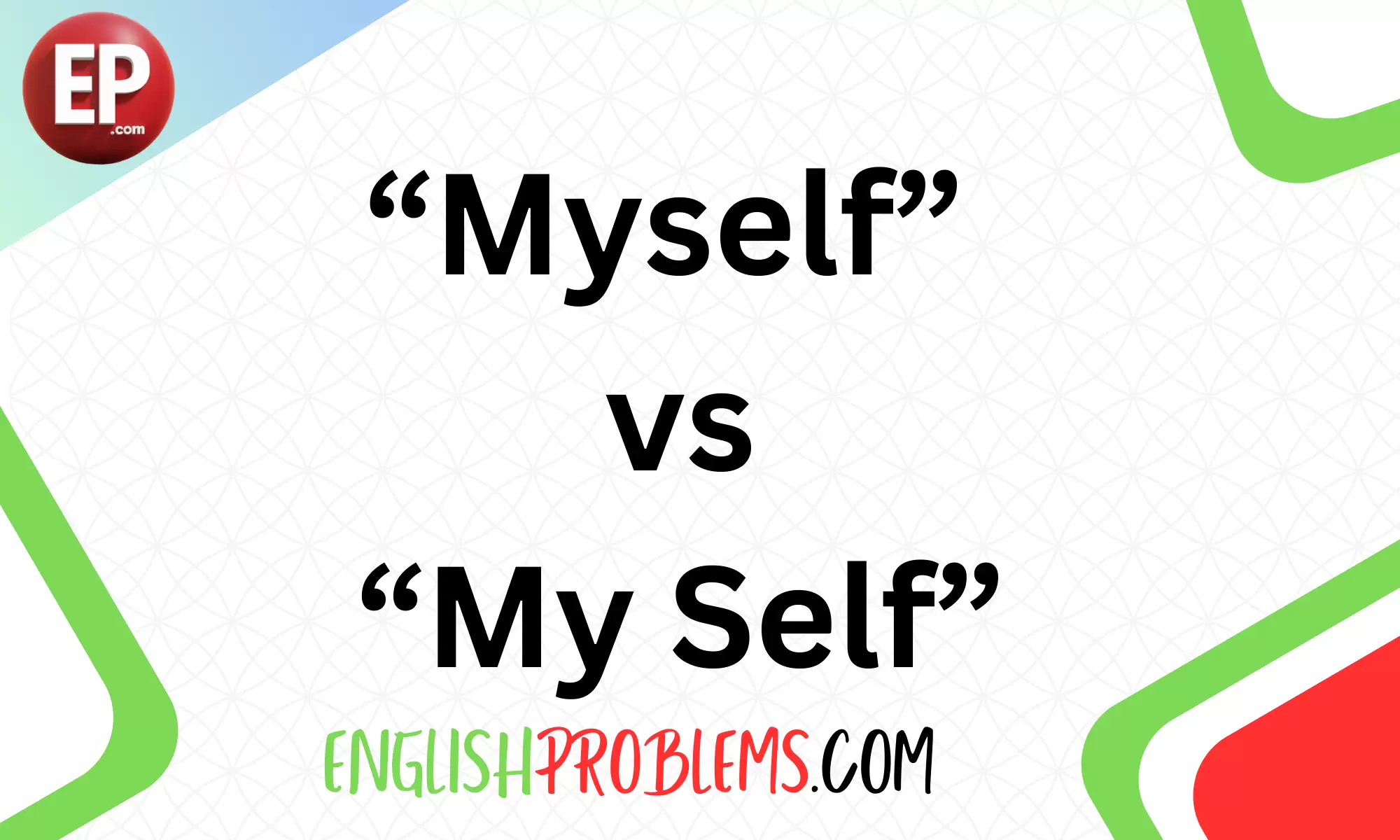Last updated on September 12th, 2024 at 11:53 am
In the world of language, small distinctions can make a big difference in clarity and meaning. One such distinction lies between “myself or my self.”
These terms might seem interchangeable at first glance, but they have different uses and meanings. Understanding this difference is crucial for clear and effective communication.
This guide will delve deep into the nuances of these terms, offering a comprehensive explanation that will help you use them correctly.
My Self Or Myself: Which One Is Use

When deciding between “my self” and “myself,” the correct choice in most cases is “myself.” “Myself” is a reflexive pronoun, used when you’re both the subject and the object of a sentence.
For example, “I introduced myself to the group.” On the other hand, “my self” is rarely used and refers to your identity or personal sense of self, as in “I am reflecting on my self and my decisions.” So, in everyday writing, “myself” is almost always the right choice!
Understanding “Myself”
Definition and Usage
The term “myself” is a reflexive pronoun. It is used when the subject and object of a sentence are the same person. Reflexive pronouns help indicate that the action of the verb is being performed by the subject on themselves. For example:
- Reflexive Use: “I taught myself to play the guitar.”
- Emphatic Use: “I did it myself.”
In the reflexive use, “myself” shows that the action (teaching) was done by the speaker. In the emphatic use, it emphasizes that the speaker did the action independently, without help.
Grammatical Function
Grammatically, “myself” serves two primary functions: reflexive and emphatic.
- Reflexive Function: Used when the subject and object of the verb are the same. For instance:
- “She prepared herself for the interview.”
- Emphatic Function: Used to emphasize the subject’s involvement or effort. For instance:
- “I made this cake myself.”
Here’s a quick table to summarize the grammatical use of “myself”:
| Function | Example | Explanation |
| Reflexive | “He blamed himself for the mistake.” | Subject and object are the same. |
| Emphatic | “I wrote the report myself.” | Emphasizes personal effort. |
Emphasis and Reflexivity
“Myself” is particularly useful in sentences where emphasis is needed. It underscores the subject’s personal involvement or effort. For example:
- “I completed the project myself, despite the challenges.”
In contrast, reflexivity in “myself” is about actions that are self-directed. For instance:
- “She taught herself how to swim.”
The emphasis is on personal involvement, while reflexivity focuses on the subject performing the action upon themselves.
Exploring “My Self”
Definition and Context
“My self” is not a standard term in everyday grammar but appears in specific contexts, particularly in philosophical or psychological discussions. It refers to the concept of one’s personal identity or inner self.
For example:
- Philosophical Use: “Finding my self through meditation.”
In these contexts, “my self” is used to discuss a deeper, more introspective aspect of the individual.
Distinction from Reflexive Use
The distinction between “myself” and “my self” lies in their use and meaning:
- “Myself” is a grammatical tool for reflexivity and emphasis.
- “My Self” is more abstract, referring to personal identity or introspection.
Here’s a table comparing the two:
| Term | Usage | Example |
| Myself | Reflexive/Emphatic | “I cut myself while cooking.” |
| My Self | Philosophical/Identity | “Understanding my self is key to growth.” |
Examples in Philosophical or Psychological Contexts
In philosophical discussions, “my self” often explores personal identity or consciousness. For instance:
- “In seeking my self, I am exploring my true nature beyond superficial traits.”
Psychologically, it may refer to the self-concept or personal identity:
- “Therapy helped me understand my self better.”
Addressing Common Misconceptions
Misuse of “Myselves”
A common mistake is using “myselves” as a plural form of “myself.” This is incorrect because “myself” does not have a plural form. The correct forms are “myself” for singular reflexive and emphatic uses and “ourselves” for plural reflexive uses.
Example of Incorrect Usage:
- Incorrect: “I saw myselves in the mirror.”
- Correct: “I saw myself in the mirror.”
Historical Usage and Evolution
Historically, the use of “myself” has evolved from Old English to modern usage. Initially, it was used more flexibly, but contemporary grammar has standardized its role as a reflexive and emphatic pronoun.
Historical Facts:
- Old English: “Myself” was used less consistently.
- Modern Usage: It has a clear role as a reflexive and emphatic pronoun.
Practical Tips for Correct Usage
Avoiding Common Mistakes
- Do Not Use “Myselves”: This form is grammatically incorrect.
- Use “Myself” Correctly: Ensure it’s used reflexively or emphatically, not as a substitute for “I” or “me.”
Common Errors:
- Incorrect: “John and myself went to the store.”
- Correct: “John and I went to the store.”
Best Practices
To use “myself” and “my self” effectively, follow these best practices:
- Understand the Context: Use “myself” for reflexive or emphatic situations and “my self” for introspective contexts.
- Avoid Overuse: Don’t rely on “myself” as a substitute for “I” or “me.”
- Practice: Regularly check your usage to ensure correctness.
Conclusion
Understanding the distinction between “myself” and “my self” enhances clarity and precision in writing and speaking. While “myself” is a versatile reflexive and emphatic pronoun, “my self” delves into personal identity or philosophical concepts. By applying the guidelines and examples provided, you can ensure accurate and effective communication.
Additional Resources
For further reading on reflexive pronouns and self-referencing terms, consider the following resources:
- Merriam-Webster Dictionary on Reflexive Pronouns
- Cambridge Dictionary on Pronouns
- Grammar Girl’s Guide to Reflexive Pronouns
This comprehensive guide aims to clarify the usage of “myself” and “my self”, providing practical insights and examples to enhance your understanding and application of these terms.

Lucy Wright combines her academic background with a flair for simplifying the intricate details of grammar. Her practical advice and clear explanations empower readers to improve their writing skills and grasp challenging concepts effortlessly.










